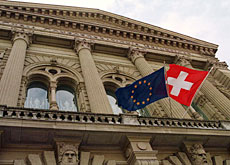Savings-tax accord “working well”

Six months after the introduction of a treaty with the European Union on savings tax, the Swiss authorities and banks say implementation is going well.
The deal, which came into force last July, preserves banking secrecy in exchange for the levying of a tax on interest earned by EU residents with Swiss bank accounts.
The treaty is part of a series of bilateral accords between Bern and Brussels.
Under the terms of the accord, EU residents with money in Switzerland can continue to keep their interest earnings secret – but only if they agree to allow their banks to levy a 15-per-cent withholding tax on all interest earned.
Swiss bankers and politicians hailed the deal as a victory for the country’s cherished tradition of banking secrecy, while EU finance ministers hoped the agreement would provide them with a welcome tax windfall.
James Nason, spokesman for the Swiss Bankers Association, told swissinfo that the first six months of the new taxation arrangement had gone “very smoothly”.
“The banks invested a lot of time and resources to get ready for July 1… and there have been no significant technical problems,” he said.
He added that the “main problem” had been determining which financial products offered to customers fell within the scope of the EU accord.
“There are literally thousands of financial products around today… so a lot of effort had to go into defining which products were affected. Another time-consuming task has been identifying those clients of Swiss banks who are affected by the accord.”
Taxing problem
Heinz Fehr of the Federal Tax Administration praised the Swiss banks for their “excellent” cooperation.
But he agreed with Nason that one of the main problems has been making sure that the right people are taxed.
“Things are pretty clear if you have a German citizen, for example, who lives in Germany and has a Swiss bank account.
“But it becomes more complicated if that same German citizen is living outside the EU – in Tunisia, say, or Egypt. In this case, they need to be able to confirm that they really live and pay taxes there [if they want to remain exempt from the savings-tax accord].”
While the banks are charged with levying the tax, it is up to the federal authorities in Bern to ensure that the money raised is passed to the relevant EU member states.
The first transfer of funds is scheduled for the end of June.
Fehr said he did not yet know exactly how much revenue the tax would generate for the EU.
“A figure that has been talked about is SFr100 million ($78 million) for the period from July to December 2005. But that is only an estimate and I don’t know whether it really will be this.”
According to Nason, the final figure will depend on how many account holders have avoided the tax by opting for “voluntary disclosure” of their interest earnings to officials in their home country.
“At the moment we don’t know how many clients have authorised their bank to inform the EU country where they are liable for tax about the interest earned,” he said.
Alternative investments
Even before the ink on the deal had dried last year, analysts were pointing out that there would be plenty of ways around the tax – including moving investments into bonds and shares.
And much to the annoyance of some EU officials, the accord does not cover income from derivatives and insurance products.
Last year Michel Aujean, a director at the European Commission’s tax and customs department, made it clear that Brussels would be keeping a close eye on how the banks implement the accord.
“What we will monitor very closely are the ways and means that could be used by the banks to escape the directive,” he said.
While the EU has been monitoring implementation, banking analysts have been keeping watch for signs that the new rules have led to a flight of capital out of Switzerland.
But both the federal authorities and Swiss banks deny that the savings-tax accord has had much impact on the flow of foreign capital into the country.
“We have no evidence of radical shifts of assets in or out of Switzerland because of [the EU directive],” said Nason.
For Fehr, the true test of whether clients remain loyal to Swiss banks is likely to come when the withholding tax rate increases from the current 15 per cent to 35 per cent by 2011.
“I’ve heard [from the banks] that it’s not very difficult for clients to cope with a rate of 15 per cent, which isn’t very much.
“But the situation may change when the rate increases to 35 per cent, which would be much more reason to think about [taking your money elsewhere].”
swissinfo, Ramsey Zarifeh
The savings-tax accord came into force on July 1, 2005.
Under the terms of the agreement, Swiss banks are obliged to collect a so-called “withholding tax” on the interest earned by account holders who live in the European Union.
Account holders can avoid the tax if they make a voluntary declaration to their home tax authorities.
The tax rate is currently set at 15% but will rise to 35% by 2011.
The treaty states that 75% of the proceeds will be passed on to the EU member state concerned, with the remainder going to the Swiss federal coffers and the cantons.

In compliance with the JTI standards
More: SWI swissinfo.ch certified by the Journalism Trust Initiative










You can find an overview of ongoing debates with our journalists here . Please join us!
If you want to start a conversation about a topic raised in this article or want to report factual errors, email us at english@swissinfo.ch.